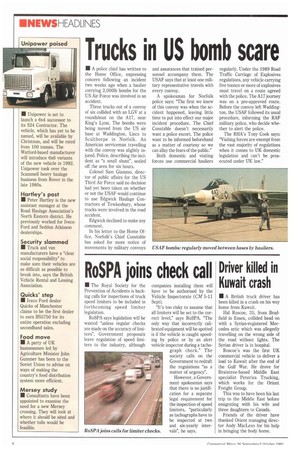Trucks in US bomb scare
Page 8

If you've noticed an error in this article please click here to report it so we can fix it.
• A police chief has written to the Home Office, expressing concern following an incident two weeks ago when a haulier carrying 2,000lb bombs for the US Air Force was involved in an accident.
Three trucks out of a convoy of six collided with an LGV at a roundabout on the Al?, near King's Lynn. The bombs were being moved from the US air base at Waddington, Lines to Sculthorpe in Norfolk, An American serviceman travelling with the convoy was slightly injured. Police, describing the incident as "a small shunt", sealed off the area for six hours.
Colonel Sam Giarnmo, director of public affairs for the US Third Air Force said no decision had yet been taken on whether or not the USAF would continue to use Edgwick Haulage Contractors of Tewkesbury, whose trucks were involved in the road accident.
Edgwick declined to make any comment.
In his letter to the Home Office, Norfolk's Chief Constable has asked for more notice of movements by military convoys and assurances that trained personnel accompany them. The USAF says that at least one military representative travels with every convoy.
A spokesman for Norfolk police says: "The first we knew of this convoy was when the accident happened, leaving little time to put into effect our major incident procedure, The Chief Constable doesn't necessarily want a police escort. The police want to be informed beforehand as a matter of courtesy so we can allay the fears of the public."
Both domestic and visiting forces use commercial hauliers regularly. Under the 1989 Road Traffic Carriage of Explosives regulations, any vehicle carrying five tonnes or more of explosives must travel on a route agreed with the police. The A17 journey was on a pre-approved route. Before the convoy left Waddington, the USAF followed its usual procedure, informing the RAF military police, who decide whether to alert the police.
The RHA's Tony Cook says: "Visiting forces are exempt from the vast majority of regulations when it comes to UK domestic legislation and can't be prosecuted under UK law."




































































































